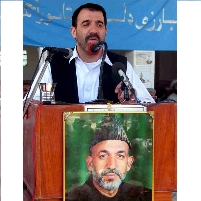Karzai Family Inc. in Afghanistan
Friday, May 14, 2010
 Ahmed Wali Karzai with Poster of Hamid (photo: EPA)
Ahmed Wali Karzai with Poster of Hamid (photo: EPA)
Karzai is not just the last name of the president of Afghanistan—but also the name of perhaps the most powerful family in the country. A new report produced by the Institute for the Study of War states that the Karzai family exerts enormous influence, if not control, over Kandahar, one of Afghanistan’s most important provinces and a focal point of the United States’ campaign against the Taliban.
At the center of power in the region is not Hamid Karzai, the national leader, but his younger half-brother, Ahmed Wali Karzai, said to possess “shadow ownership” of the local government. He also exerts “considerable influence over business life” in Kandahar City, and has control of two private security forces, Watan Risk Management and Asia Security Group. The latter is run by the brothers’ cousin, Hashmat Karzai.
Ahmed Wali Karzai has been described as ”the central obstacle” to changing local governance whose “behavior and waning popularity among local populations promote instability and provide space for the Taliban to exist,” because the Taliban are seen as the most viable alternative to the Karzai family.
Other key family members include Hamid’s older brothers, Mahmoud and Qayum Karzai.
Mahmoud moved to the United States in 1976, and, with his brother Qayum, opened a string of Afghan restaurants. Their half-brother, Ahmed Wali, managed a restaurant in Chicago. Hamid stayed behind in Afghanistan with his father, Abdul Ahad Karzai, who had served as deputy speaker of the national parliament in the 1960s. After the Soviets retreated from the country in 1989, both Hamid and his father served in the new government. But when there was a change of leadership, Hamid was forced to flee to Pakistan.
When the Taliban consolidated power in 1993 and 1994, Hamid supported them and was offered the position of ambassador to the United Nations. However, he saw that the Taliban were heavily influenced by the Pakistani military’s Inter-Services Intelligence (ISI) and he never joined the Taliban government.
Instead, Hamid Karzai organized against the Taliban, who responded by assassinating his father in 1999. When the U.S. invaded Afghanistan after the terrorist attacks of September 11, 2001, the CIA and U.S. Special Forces supported Karzai as one of their proxies in the fight against the Taliban. When a leader was needed to serve as interim president in Kabul after the Taliban were driven from power, the U.S. and its allies chose Hamid Karzai. He and his three brothers soon divvied up a growing empire. Mahmoud was the businessman; Ahmed Wali took charge of Kandahar; and Qayum was satisfied with being the advisor behind the throne.
Relying on the family’s support from the Bush administration, Ahmed Wali gained control of the distribution of aid from NGOs, and soon took effective control of not just the security industry, but also the real estate and transportation sectors of the Kandahar economy.
-David Wallechinsky, Noel Brinkerhoff
How About Those Other Private Military Contractors? (by David Isenberg, Huffington Post)
- Top Stories
- Unusual News
- Where is the Money Going?
- Controversies
- U.S. and the World
- Appointments and Resignations
- Latest News
- Trump Goes on Renaming Frenzy
- Trump Deports JD Vance and His Wife
- Trump Offers to Return Alaska to Russia
- Musk and Trump Fire Members of Congress
- Trump Calls for Violent Street Demonstrations Against Himself






Comments